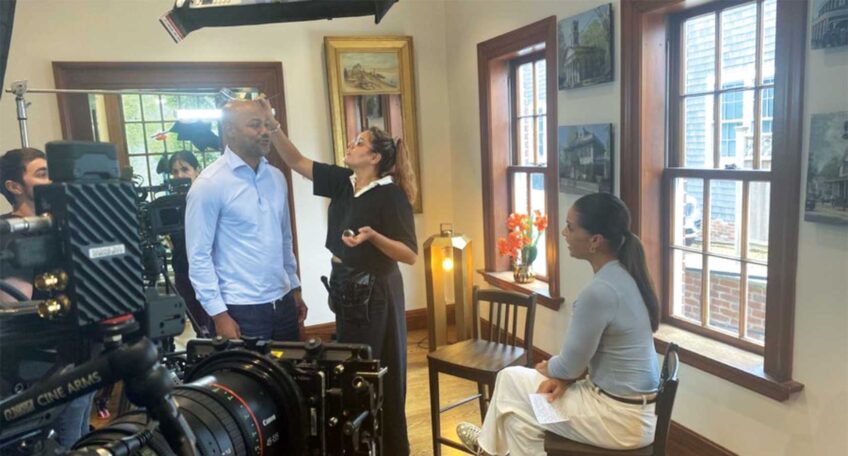
Banner Business Sponsored by The Boston Foundation
Capital is the lifeblood of any business, as every businessperson knows. But for many small-business owners of color, access to capital can be a challenge. According to The Boston Foundation‘s “The Color of the Capital Gap” report published in November 2023, Boston’s small businesses of color face a $603 million annual funding gap due to structural barriers and the racial wealth gap. Traditional lending requirements prevent small business owners from accessing capital and may even discourage them from seeking capital.
A new report by UMass Donahue Institute, “Supporting Diverse Small Business Owners in Boston,” cites four themes in the challenges businesses of color face:
Systemic financial barriers. “Requirements for obtaining capital can prevent business owners that are from historically disadvantaged groups from growing and building wealth. Small-scale businesses with modest but critical financing needs are particularly underserved,” according to the report. Betty Francisco, CEO of the Boston Impact Initiative (BII), says, “Barriers such as lender bias, limited access to family wealth, and not having well developed networks of business contacts have many Black entrepreneurs relying on their own limited resources as a form of bootstrapping, and, as a result, overleveraging their personal credit, damaging their credit rating and at times falling prey to predatory lending.”
The racial wealth gap. One of the very first sources of capital for many entrepreneurs is a network of friends and family. Donahue reports that “two-thirds of entrepreneurs use personal or family savings to start a business, and entrepreneurs of color are often at a disadvantage for this type of capital because of the racial wealth gap.” The number one reason many survey participants said they believe BIPOC small-business owners have a harder time accessing credit was “lack of personal wealth or assets for collateral.”
Traditional lending requirements that prevent small businesses from accessing capital. A small-business owner cited in the Donahue report said that he did not feel that a grant program from the city of Boston was meant for small businesses because they asked for so many things, including three years of tax returns, low levels of debt, personal guarantees and strong credit ratings. One 20-year business owner of a flower shop reported, “I know I have potential. I know how to run a business … I can only qualify for five grand tops. It is very hard for me now to have the working capital in order to get to the next step.”
Discouragement from past experiences and limited resource availability. The Boston Foundation’s “Color of the Capital Gap” report states that 55% of white businesses report having great challenges accessing capital, while 88% of Latinx and 85% of Black businesses report having trouble accessing capital. BIPOC businesses are denied financing at almost two times the rate of white businesses. Further, when BIPOC businesses are successful in getting capital, the loan amounts tend to be smaller than those of white borrowers. Small-business loans by Massachusetts banks in majority-white areas average $423,000 versus just $255,000 in majority-people-of-color areas. As a result, 84% of Black small-business financing applications had a shortfall, receiving less than the full amount requested. A full 62% of loan applications by Black business owners were denied.
Start-ups of color face an even more daunting challenge, with more than half (53%) completely denied loans, and a meager 0.6% of venture capital going to Black entrepreneurs. The collective outcome of these factors has led to an estimated $603 million in annual unmet demand for financing for small businesses of color.
Local solutions are emerging. The Donahue report recommends focusing on building entrepreneurs’ capacity to meet lending requirements and reducing barriers to capital by expanding opportunities for targeted businesses that have promising business plans and deep community connections.
Francisco, of BII, believes that non-traditional lending products are a key component of the solution.
“Entrepreneurs are always looking for capital, but what type of capital is best for their business and where can they get that capital?” she says. “BII reviews the whole spectrum of capital available to early-stage entrepreneurs. BII explores the following: What is the need? What is the company’s growth potential? Is the capital need a seasonal cashflow issue? BII structures non-dilutive, flexible loans at lower rates than other capital sources.”
On March 28, BII and the Black Economic Council of Massachusetts (BECMA) announced a $325,000 investment in And Still We Rise (ASWR), a liberation-focused mental health and consulting practice providing therapy, coaching, and consulting services to individuals and organizations.
“Since 2018, when I founded the company, we went from just me to a team of almost 80 people. Now, we provide mental health services to over 2,000 people in Massachusetts,” says Dr. Natasha Holmes, ASWR’s founder and CEO.
Holmes tells her story of applying for a loan four times and being denied.
“I applied for a $20,000 loan from Bank of America four times and experienced road block after road block of being denied each time. As a clinical psychologist, I had forgotten the effect stress has on the body. I had migraine headaches,” Holmes says.
“I see why there are so few entrepreneurs of color in this space,” she adds. “In 2021, I was one of five Black-owned psychologist practices in a resource group. Today, I am the only one still in business. Access to capital was not the only reason the others closed, but it was a big issue in each of them.”
With the BII and BECMA funding, “it feels like a totally different business.” Holmes says. “BII and BECMA gave me the space to explain my business, where the other lenders did not.”
BII refinanced ASWR’s high-cost loans into a revenue-based term loan. BECMA provided a line of credit to meet cash flow issues. Now, ASWR is firmly in the black, with revenues in the millions of dollars.
Kamaal Jarrett, founder and owner of Hillside Harvest, a maker of hand-crafted premium Jamaican sauces, is another success story.
“I wanted to create a brand that elevated the Caribbean expression in food by introducing people to unique flavors and recipes,” he says.
Jarrett successfully launched Hillside in 2018 using funds from his own savings. Along with success, however, came a need to build inventories, increase marketing, manage seasonal cash flows and hire part-time staff. In short, he needed access to capital. BII stepped in with a flexible revenue-based product that met Jarrett’s cash needs without requiring dilution of ownership. He is now focusing his attention on scaling the business and expanding operations.






